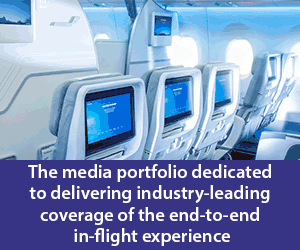Airbus has begun in-flight trials of its IoT connected cabin technologies onboard an A350-900 Flight Lab aircraft.
Revealing the news at the APEX EXPO, Airbus argues this makes it the first aircraft manufacturer to undertake such flight-testing of actual connected cabin innovations.
With the Airspace Connected Experience platform, unveiled last year at APEX EXPO, the manufacturer aims to provide a new personalised experience for passengers and provide opportunities to boost ancillary revenues and operational efficiencies for airlines.
Ingo Wuggetzer, Airbus VP cabin marketing, gave a presentation in APEX EXPO, discussing the company’s aims of “pioneering progress in passenger experience” with a focus on long-haul comfort and pioneering IoT in aircraft.
Commenting on the announcement of inflight testing of IoT, Wuggetzer said: “IoT is flying, it’s not a concept or a dream.”
The Flight Lab aircraft is an A350-900 flight-test aircraft, MSN002 and fitted with an Airspace cabin. Airbus said this serves as the ideal platform to evaluate the new connected cabin technologies in flight. In conjunction with Airbus’ cabin partners, an initial set of working elements have been installed.

Airbus suggest the connected cabin ecosystem will enable significant value-added services for passengers, airlines and crews.
For passengers, Airbus suggests they could receive a more personalised experience based on available data, particularly covering pre- and remote meal ordering or booking of private bin space, as well as a tailor-made IFE offer.
For airlines, Airbus expect it could generate new ancillary revenues through personalised retail and advertisement as well as new services enabled by IoT approaches. Operational efficiency could also be improved applying predictive maintenance, avoiding waste for example. While crews will benefit from greater efficiency, digitally-enabled by real-time data from the IoT platform throughout the cabin and a mobile smart device will allow crews to monitor and operate all components.
Airbus said the testing of these innovations in an Airbus Flight Lab environment is key to bringing an integrated Connected Experience to fruition and being able to validate and refine them in an airbourne cabin. The tests will allow the various elements to be operated and monitored during a normal flight cycle, Airbus said, particularly with regard to the end-to-end data flow robustness within the systems and between them.





